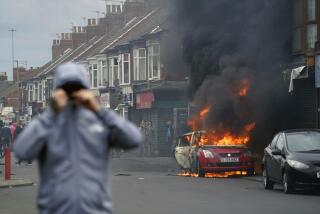Protestants Attack British Cabinet Minister in Belfast
- Share via
LONDON — A British Cabinet minister was physically attacked by a group of angry Protestants on Wednesday as he walked from his car to the city hall entrance in Northern Ireland’s provincial capital of Belfast.
Tom King, secretary of state for Northern Ireland, was hit by an egg, severely jostled and grabbed in a headlock during the attack by a handful of men who broke away from a small demonstration outside the city hall.
At least one punch was thrown, but it apparently missed King as his aides threw up their briefcases to fend off attackers. After King found the building’s main entrance locked, he was forced to retreat to his car, which eventually drove him to a side door, where he finally entered the building.
The demonstrators, said to include a large number of city councilors from the predominantly Protestant Democratic Unionist Party headed by the Rev. Ian Paisley, had apparently gathered at the city hall to confront King with their anger over the recent Anglo-Irish agreement aimed at promoting sectarian peace in the troubled province.
Protestant militants have charged that the agreement is a first step toward ending British control of Northern Ireland, which has seen centuries of sectarian violence between Protestants and Roman Catholics.
The agreement, which provides the mainly Catholic Irish Republic with a formal consultative role in Northern Ireland, has been bitterly denounced as a sellout by leaders of the province’s Protestant majority.
Several of the Belfast protesters carried large red and white signs declaring, “Ulster Says NO.” Northern Ireland consists of six counties from the ancient Irish province of Ulster.
It was unclear if Belfast city councilors were among those involved in the attack on King, but one Democratic Unionist member of Northern Ireland’s provincial assembly, George Seawright, was seen to leap on the trunk of King’s car. Seawright achieved notoriety earlier this year for declaring that Catholics should be incinerated.
Weak Security
The small size of the demonstration, roughly 30 people, made the incident more of an indictment of the minister’s security than representative of any groundswell of resentment against the agreement.
King, the senior representative of the British government in Northern Ireland, was reported severely shaken by the assault, and subsequently issued a statement denouncing the attackers as thugs.
“I do not believe that the thugs who took part in this display of hooliganism represent the decent Unionist community in this province,” King said in the statement. Those known as Unionists, because of their desire to remain a part of Britain, include the vast majority of Ulster’s Protestants.
“If they are not capable of rational argument and resort to this method, then it can only hurt their case,” he said.
Paisley arrived at the protest shortly after the violence had ended and confronted King inside the city hall building. He later declared to reporters that King “had to leave the city hall like a man who had committed a crime. He has committed the greatest possible crime--treason.”
The lord mayor of Belfast, John Carson, attended a lunch with King at the city hall following the incident. As a result, he reportedly faces expulsion from the Official Unionist Party, a relatively moderate, mainly Protestant organization, for violating a ban on dealing with British Cabinet ministers. The boycott was agreed on by all Protestant-based parties as part of a protest campaign against the Anglo-Irish accord.
The same parties lodged a legal objection to the agreement in the London High Court on Tuesday.
The Irish Parliament is expected to approve the agreement Friday, and the British Parliament is scheduled to take up the matter next week.
The first major test of the depth of opposition to the agreement is expected Saturday in Belfast, where Protestant leaders have called for a mass demonstration against it.
Nearly 2,500 people have died and another 24,000 have been injured in Northern Ireland as a result of sectarian violence since 1968.
More to Read
Sign up for Essential California
The most important California stories and recommendations in your inbox every morning.
You may occasionally receive promotional content from the Los Angeles Times.













